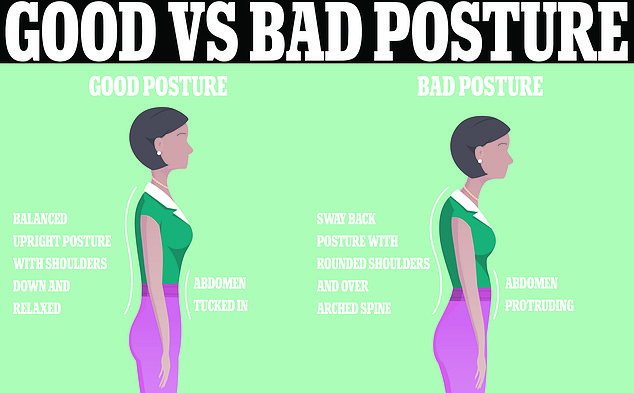Experts have sounded the alarm over a little-known debilitating shoulder condition amid a rise in cases among younger adults.
Thoracic outlet syndrome—where nerves or blood vessels between the neck and shoulder get squashed—has long been thought to be triggered by repetitive arm action, such as gardening or tennis, or a blunt trauma injury like a car accident.
In older patients, this can cause swelling and inflammation due to excessive muscle use, and reduce the size of the thoracic outlet slightly.
But surgeons now claim they are increasingly seeing younger patients in their mid to late twenties, presenting with such symptoms.
The cause, they believe, is desk-based office work that can see employees hunched over computer screens for hours on end.
Office-based workers working on the move using laptops and mobiles can too, cause pain the the hands and shoulders as a result of working in transit in cramped or awkward positions.
Patients as young as 27, who have been diagnosed with the condition, have also told the Daily Mail they were told their poor posture as a result of their desk-based job could have caused the condition. One was even left unable to raise her arms due to the pain.
Dr Sabine Donnai, a GP and founder of private London health clinic Viavi told the Daily Mail: ‘Being on laptops and mobile phones all the time gives us a chronic forward head posture which together with rounded shoulders reduces the already narrow space where the nerves going to the arms feed through.’

Thoracic outlet syndrome—where nerves or blood vessels between the neck and shoulder get squashed—has long been thought to be triggered by repetitive arm action, such as gardening or tennis, or a blunt trauma injury like a car accident
Two-thirds of people in the UK will suffer shoulder pain at some point.
The most common causes are rotator cuff syndrome—where muscles that stabilise the shoulder become inflamed—and frozen shoulder, when the tissue around the joint becomes tight.
Thoracic outlet syndrome, however, has long flown under the radar given its vague and diverse symptoms.
Equally, there is no concrete diagnostic criteria among health professionals.
One study published last year in The Annals of The Royal College of Surgeons of England, which assessed thoracic outlet syndrome cases over 17 years, found patients were left waiting at least 18 months on average for a diagnosis.
‘Patient referrals in hospital are often received from specialities including neurologists, orthopaedics and pain specialists,’ doctors from Medway NHS Foundation Trust in Kent, concluded.
While US hospitals have ‘clear’ referral criteria in place, ‘the UK has no such system and undoubtedly would benefit from development of centres with clear referral pathways,’ they added.
Research on the condition, though limited, suggests it affects up to three people in every 100,000 on average.

But other experts have put the figure as high as three in 1,000.
Symptoms include numbness or tingling in the arm or fingers and pain or aches in the neck, shoulder, arm or hand.
Arm fatigue, a weak grip or swelling are among other common signs.
This is because the main blood vessels and nerves that supply the arm and hand—the subclavian artery and vein, and the brachial plexus bundle of nerves—have to pass through a small gap between the collarbone and the first rib, known as the thoracic outlet.
Sometimes these blood vessels and nerves can become compressed, thoracic outlet syndrome.
Research shows that women are more vulnerable to this compression, as the outlet tends to be anatomically smaller in women.
Dr Donnai added that women generally suffer more from unstable joints, as a result of higher oestrogen levels—a sex hormone which influences collagen production and muscle elasticity.
Indeed, one British study published earlier this year in journal Annals of Vascular Surgery, which assessed diagnoses across the UK over a period of a year, found two thirds of patients with thoracic outlet syndrome were female.
‘There is considerable variability in the diagnosis and management of patients with thoracic outlet syndrome across vascular centres in the UK,’ the vascular surgeons from the West Midlands concluded.
The 2024 research published in The Annals of The Royal College of Surgeons of England also found 64 per cent of patients were female, with some as young as 27.
There are treatments available, but there is no cure.
Under NHS guidelines, sufferers often undergo physiotherapy where they are given stretching and strengthening exercises that reduce pressure on nerves and blood vessels medicines.
Patients may also need medicines to help treat pain, relax muscles, improve circulation and reduce the risk of blood clots.
Surgery may sometimes be recommended for those suffering serious problems, such as blood clots, and if other treatments have not worked.
The NHS guidance itself stresses the importance of maintaining a good posture, saying ‘don’t slouch’.
However, there’s no universally-accepted definition of a perfect posture.
Experts have long warned that hunching over a desk will sentence us to a lifetime of back, shoulder and neck pain.
Sitting up straight is still considered to be the holy grail to helping prevent pain, in the same way that slouching is frowned upon.
It’s supported by posters dotted around offices, telling workers to keep their back straight and sit with their bum pushed to the base of the chair.
Other guidance also tells workers to have their computer screen at arms length and at eye level.
Some firms even promote standing desks to their staff, under the belief the trendy gadgets will alleviate any discomfort in their back from spending ten hours slumped in a chair.












